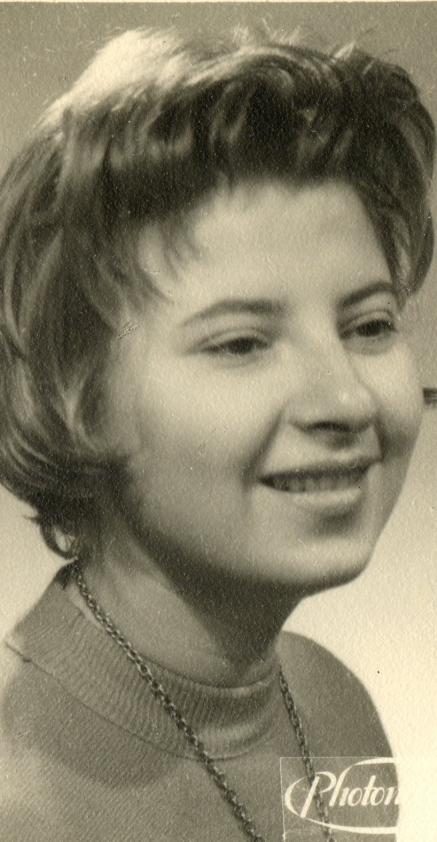European Memories
of the Gulag
BioGraphy
Micheline HERC
Micheline Herc was born in 1937 in Warsaw, where she lived with her parents. She was two years old when the Germans and Soviets divided up Poland. To escape the Germans, her parents left for Białystok, then Vilnius. Refusing to take Soviet citizenship (her father was prepared to, but her mother firmly refused), they were deported in June 1940 to the Arkhangelsk region, where they stayed until the Poles were amnestied in August 1941. Then they left for Central Asia by train and boat to a small town near Tashkent, then to Kazakhstan, where Micheline lived alongside the Kazakhs, learnt their language and took part in their cultural and religious activities.
In May 1946, they were finally allowed to leave the USSR, crossed the devastated Ukraine and got to Poland, where they discovered that all their family who had stayed had been exterminated. They went to Warsaw and then Łódź. There, her parents prepared to leave for France, where an uncle was expecting them. They arrived in Paris in September 1946. Micheline trained to be a doctor and specialised in psychiatry. Now she is retired and has taken up painting again: the devastations of war she saw from the train home, the landscapes of the Russian Far North and the colours of the Kazakh steppes recur in her paintings and her memories.
The interview with Micheline Herc was conducted in 2011 by Marta Craveri and Alain Blum.
-
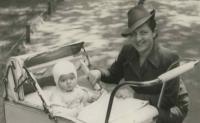 Refusing nationality and deportation
Refusing nationality and deportation
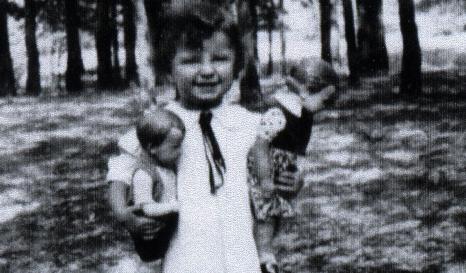
Source: Interview conducted in France by M. Craveri & A. Blum, 31/03/2011.
Licence CC BY-NC-ND.
CloseRefusing nationality and deportation
Micheline’s mother refuses to take Soviet nationality. The whole family is deported.
-
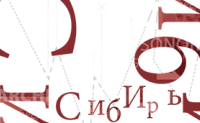 Childhood memories from ArkhangelskThe cold; teddy bear and lost dolls
Childhood memories from ArkhangelskThe cold; teddy bear and lost dolls
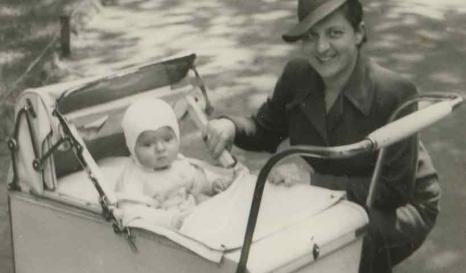
Source: Interview conducted in France by M. Craveri & A. Blum, 31/03/2011.
Licence CC BY-NC-ND.
CloseChildhood memories from ArkhangelskThe cold; teddy bear and lost dolls
-
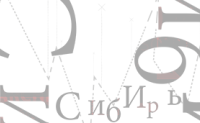 Housing in Arkhangelsk
Housing in Arkhangelsk

Source: Interview conducted in France by M. Craveri & A. Blum, 31/03/2011.
Licence CC BY-NC-ND.
CloseHousing in Arkhangelsk
-
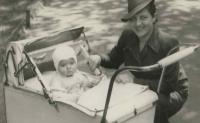 Childhood memories from ArkhangelskSongs and dances
Childhood memories from ArkhangelskSongs and dances

Source: Interview conducted in France by M. Craveri & A. Blum, 31/03/2011.
Licence CC BY-NC-ND.
CloseChildhood memories from ArkhangelskSongs and dances
-
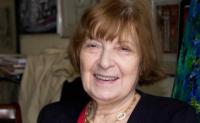 Memories of Central AsiaLove for the Kazakhs
Memories of Central AsiaLove for the Kazakhs
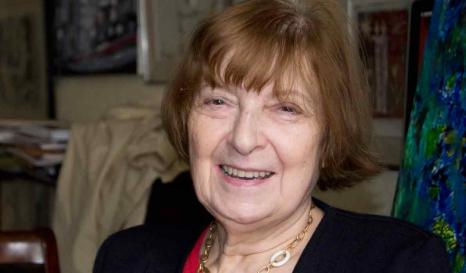
Source: Interview conducted in France by M. Craveri & A. Blum, 31/03/2011.
Licence CC BY-NC-ND.
CloseMemories of Central AsiaLove for the Kazakhs
-
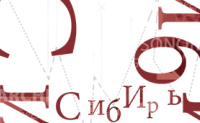 Memories of Central AsiaHunger
Memories of Central AsiaHunger

Source: Interview conducted in France by M. Craveri & A. Blum, 31/03/2011.
Licence CC BY-NC-ND.
CloseMemories of Central AsiaHunger
-
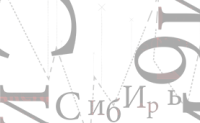 Escape attempts
Escape attempts
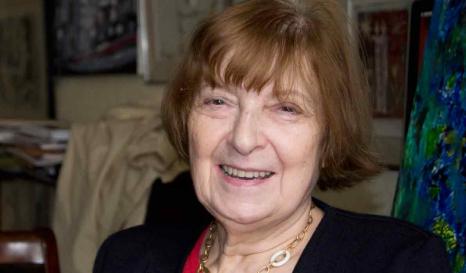
Source: Interview conducted in France by M. Craveri & A. Blum, 31/03/2011.
Licence CC BY-NC-ND.
CloseEscape attempts
Micheline’s father thought of joining Anders’Army but did not do it. But he did attempt to escape abroad several times.
-
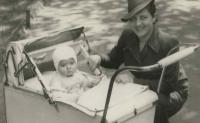 Childhood memories
Childhood memories
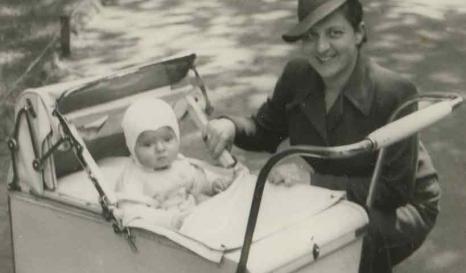
Source: Interview conducted in France by M. Craveri & A. Blum, 31/03/2011.
Licence CC BY-NC-ND.
CloseChildhood memories
-
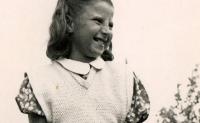 The school in Sayram, Kazakhstan
The school in Sayram, Kazakhstan
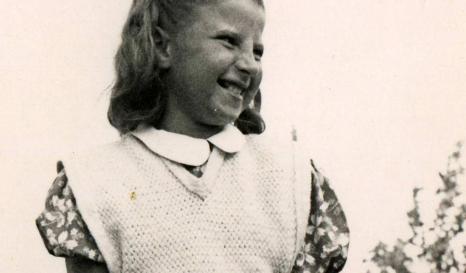
Source: Interview conducted in France by M. Craveri & A. Blum, 31/03/2011.
Licence CC BY-NC-ND.
CloseThe school in Sayram, Kazakhstan
-
 Return to Łódź, discovering anti-Semitism.
Return to Łódź, discovering anti-Semitism.
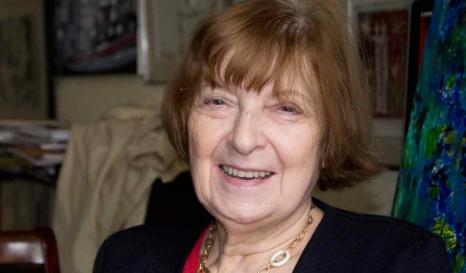
Source: Interview conducted in France by M. Craveri & A. Blum, 31/03/2011.
Licence CC BY-NC-ND.
CloseReturn to Łódź, discovering anti-Semitism.
On her return to Łódź, Poland, Micheline Herc discovers she is Jewish and suffers from anti-Semitism.
-
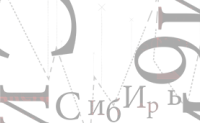 Return to Łódź: Discovering the ghetto and extermination
Return to Łódź: Discovering the ghetto and extermination

Source: Interview conducted in France by M. Craveri & A. Blum, 31/03/2011.
Licence CC BY-NC-ND.
CloseReturn to Łódź: Discovering the ghetto and extermination
On her return to Łódź, Poland, Micheline Herc discovers she is Jewish and suffers from anti-Semitism.
-
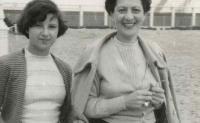 Memory – repression
Memory – repression
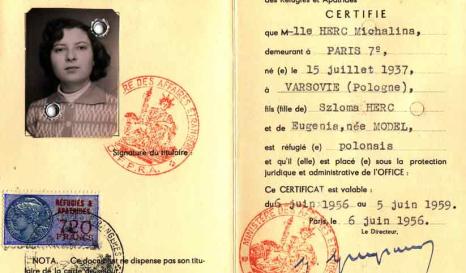
Source: Interview conducted in France by M. Craveri & A. Blum, 31/03/2011.
Licence CC BY-NC-ND.
CloseMemory – repression
-
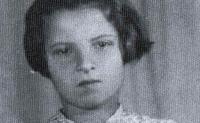 Wonderment in Paris
Wonderment in Paris
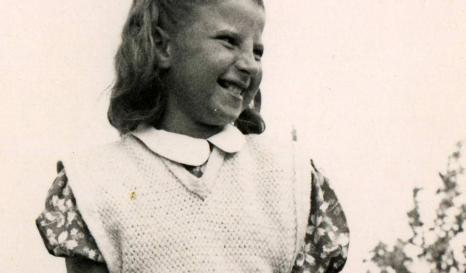
Source: Interview conducted in France by M. Craveri & A. Blum, 31/03/2011.
Licence CC BY-NC-ND.
CloseWonderment in Paris
-
 A foreigner in Paris
A foreigner in Paris

Source: Interview conducted in France by M. Craveri & A. Blum, 31/03/2011.
Licence CC BY-NC-ND.
CloseA foreigner in Paris
-
 In Paris: Catching up a life lost
In Paris: Catching up a life lost

Source: Interview conducted in France by M. Craveri & A. Blum, 31/03/2011.
Licence CC BY-NC-ND.
CloseIn Paris: Catching up a life lost
-
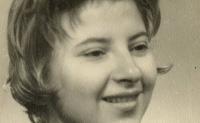 A foreigner; a stateless person
A foreigner; a stateless person
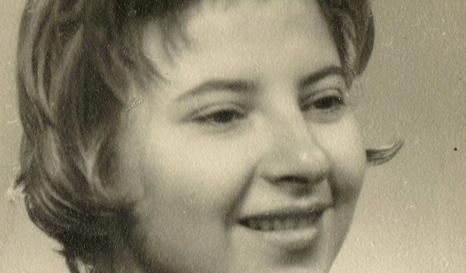
Source: Interview conducted in France by M. Craveri & A. Blum, 31/03/2011.
Licence CC BY-NC-ND.
CloseA foreigner; a stateless person
-
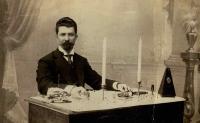 A Russian, Polish and French past
A Russian, Polish and French past
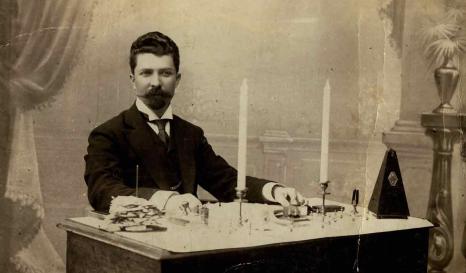
Micheline Herc’s grandfather, Mikhail Model, before the First World War (Photograph, Anonymous, circa 1914). Source: Micheline Herc's Personal archive.
Media subject to copyright.
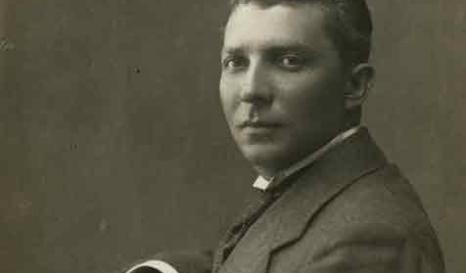
Micheline Herc’s grandfather (Photograph, Anonymous, Undated). Source: Micheline Herc's Personal archive.
Media subject to copyright.
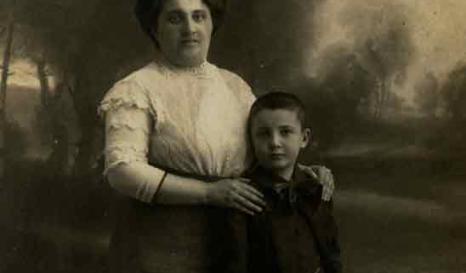
Micheline Herc’s maternal grandmother, Sarah Model, with her son, David, before the First World War (Photograph, Anonymous, circa 1914). Source: Micheline Herc's Personal archive.
Media subject to copyright.
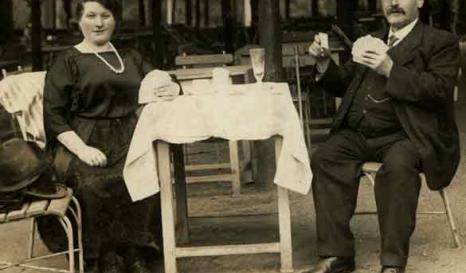
Micheline Herc’s great-grandfather in Karlsbad, 15 August 1921 (Photograph, Anonymous, 1921). Source: Micheline Herc's Personal archive.
Media subject to copyright.
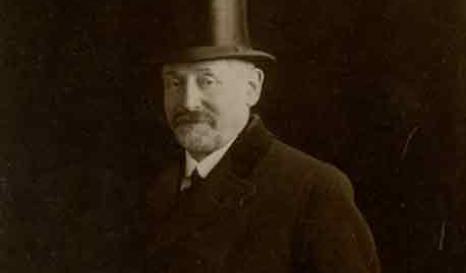
Micheline Herc’s paternal great-grandfather (Photograph, Anonymous, Undated). Source: Micheline Herc's Personal archive.
Media subject to copyright.
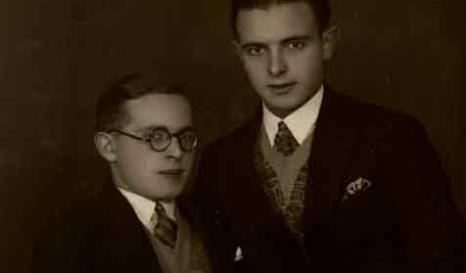
Szloma, Micheline Herc’s father, and his brother Gutek. Gutek died in the Warsaw Ghetto (Photograph, Anonymous, 1920-1930). Source: Micheline Herc's Personal archive.
Media subject to copyright.
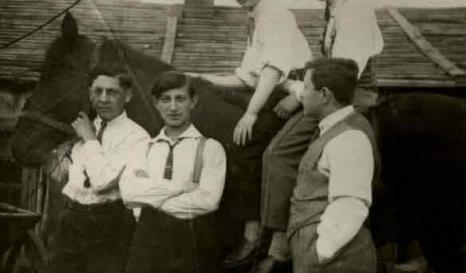
Szloma, Micheline Herc’s father, on horseback in Warsaw (Photograph, Anonymous, 1924). Source: Micheline Herc's Personal archive.
Media subject to copyright.
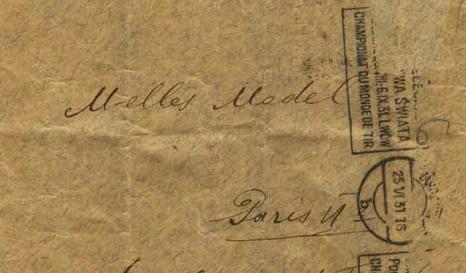
Letter sent to Micheline Herc’s mother (Evgenia Model) and her sister (Marie Model) (Photograph, Anonymous, 1931). Source: Micheline Herc's Personal archive.
Media subject to copyright.
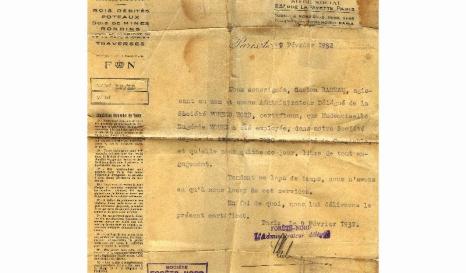
Micheline Herc’s mother’s work certificate in France (Photograph, Anonymous, 1932). Source: Micheline Herc's Personal archive.
Media subject to copyright.
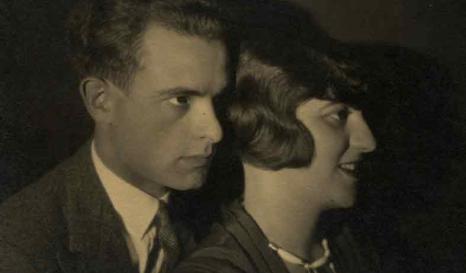
Micheline Herc’s parents just before their marriage (Photograph, Anonymous, 1932). Source: Micheline Herc's Personal archive.
Media subject to copyright.
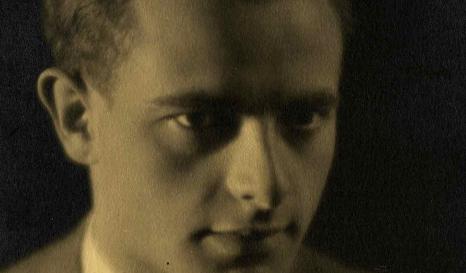
Szloma , Micheline Herc’s father (Photograph, Anonymous, 1932). Source: Micheline Herc's Personal archive.
Media subject to copyright.
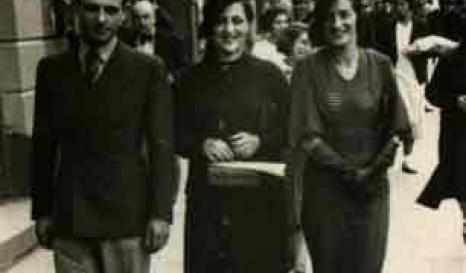
Szloma and Evgenia, Micheline Herc’s father and mother, in Warsaw (Photograph, Anonymous, 1934). Source: Micheline Herc's Personal archive.
Media subject to copyright.
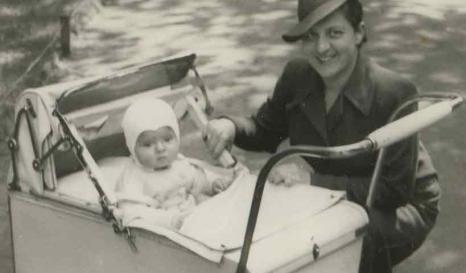
Evgenia, Micheline Herc’s mother and her daughter in Warsaw, May 1938 (Photograph, Anonymous, 1938). Source: Micheline Herc's Personal archive.
Media subject to copyright.
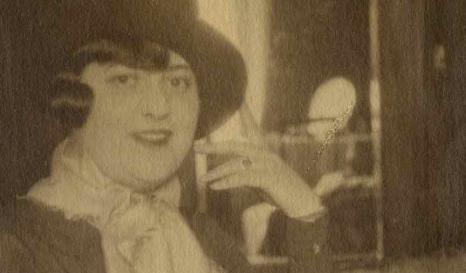
Evgenia, Micheline Herc’s mother, May 1938 (Photograph, Anonymous, 1938). Source: Micheline Herc's Personal archive.
Media subject to copyright.
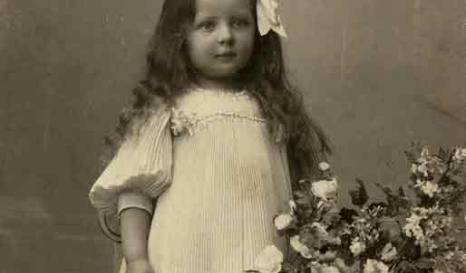
Micheline Herc's mother's aunt (maternal line) at Kursk (Photograph, Anonymous, Undated). Source: Micheline Herc's Personal archive.
Media subject to copyright.
CloseA Russian, Polish and French past
Before the Second World War, Micheline Herc’s family lived between Moscow and Warsaw. Her parents completed their studies in France, where they met, then went back to Warsaw, where they married and decided to stay. The members of the family were businesspeople or industrialists: Mikhail Model, a Russian, close to the Mensheviks, was vice-chairman of all-Russian industries until 1922 and possessed three factories in Kharkov and Kiev. He emigrated to Danzig in 1922, where he continued as an industrialist. Josef and Sonia Herc (Hertz), the paternal grandparents. Josef worked in the fur trade with links to London, with her father who had made a success of his business. They were killed in Treblinka.
Micheline Herc’s father was born in Warsaw, Poland, and her mother in Kursk, Russia.
Gutek, one of Micheline Herc’s paternal uncles, born in 1911, was an international lawyer in London, but returned to Warsaw in 1940 to help his parents and was killed in the ghetto. Marian, her eldest uncle, was deported.
On her mother’s side, David, Micheline’s great-uncle, stayed on in Moscow, where he was the senior director of GUM. Sima, her great-aunt, was in the battle for Leningrad. Marie Rosenberg, on the other hand, Micheline’s maternal aunt, left for France at the same time as Evgenia, Micheline’s mother, to study business (in 1924-25). Then she stayed on in France.
-
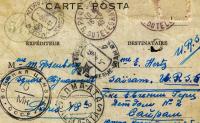 Letters from far away
Letters from far away
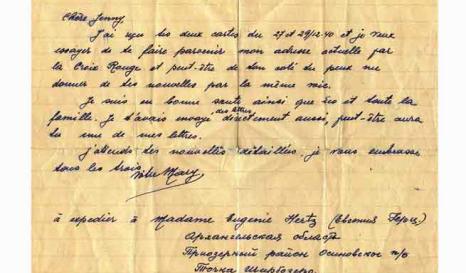
Letter from Marie Rosenberg sent on 18 March 1941 from Châteauneuf-la-Forêt, Haute-Vienne to Lake Chirb, Arkhangelsk region (Photograph, Anonymous, 1941). Source: Micheline Herc's Personal archive.
Media subject to copyright.
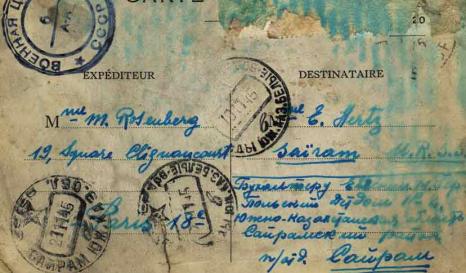
Front of a card sent from Paris to Micheline Herc’s mother in Kazakhstan, received on 21 November 1945 (Photograph, Anonymous, 1945). Source: Micheline Herc's Personal archive.
Media subject to copyright.
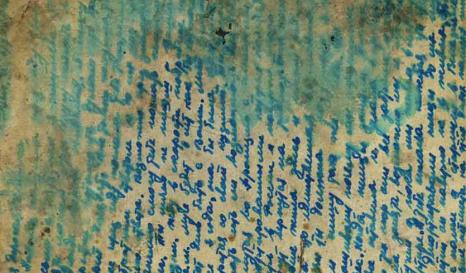
Back of a card sent from Paris to Micheline Herc’s mother in Kazakhstan, received on 21 November 1945 (Photograph, Anonymous, 1945). Source: Micheline Herc's Personal archive.
Media subject to copyright.
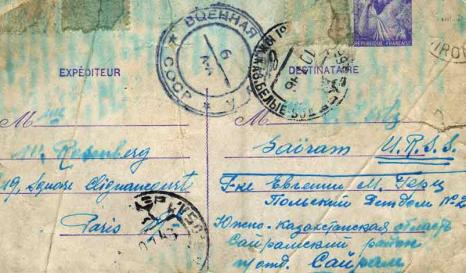
Front of a card from Paris to Sayram (Correspondence, Anonymous, 1946). Source: Micheline Herc's Personal archive.
Media subject to copyright.
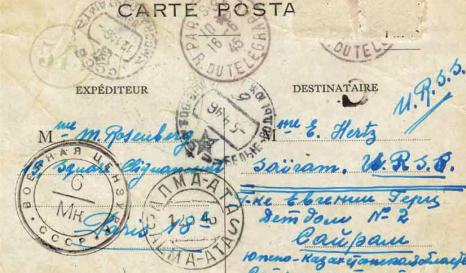
Letter sent from Paris on 16 June 1945, received in Sayram on 5 April 1946 (Photograph, Anonymous, 1945-1946). Source: Micheline Herc's Personal archive.
Media subject to copyright.
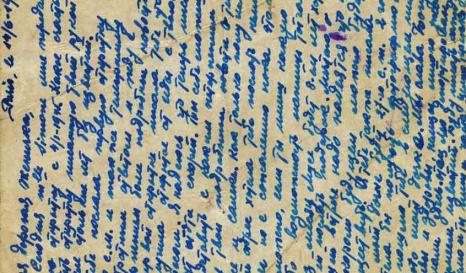
Back of letter sent from Paris on 16 June 1945, received in Sayram on 5 April 1946, written on 14 June 1945 (Photograph, Anonymous, 1945-1946). Source: Micheline Herc's Personal archive.
Media subject to copyright.
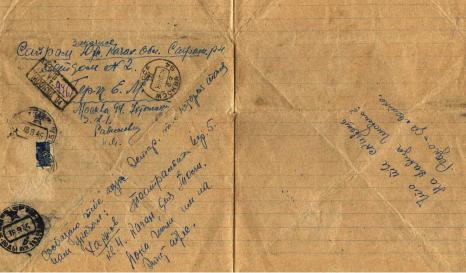
Front of a letter from Ida Radilovski, wife of Micheline’s maternal great-uncle, in Moscow to Micheline’s mother in Sayram (Correspondence, Anonymous, 1945). Source: Micheline Herc's Personal archive.
Media subject to copyright.
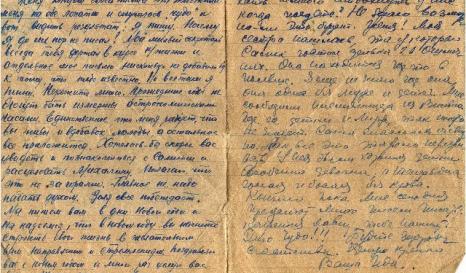
Back of a letter from Ida Radilovski, wife of Micheline’s maternal great-uncle, in Moscow to Micheline’s mother in Sayram (Correspondence, Anonymous, 1945). Source: Micheline Herc's Personal archive.
Media subject to copyright.
CloseLetters from far away
In deportation, in the remote corners of the Russian Far North and Kazakhstan, Micheline Herc’s parents got letters from Paris, Châteauneuf-la-Forêt, and Moscow, all from relatives. These letters bear witness to the sparse but real communication between these worlds distant from each other.
The most surprising one is probably the letter that left Châteauneuf-la-Forêt on 18 March 1941 and arrived at “Lake Shirb point, Osinov postal centre, Priozyorny district, Arkhangelsk region”, a remote place deep in the Soviet Far North. Unfortunately we do not know how long it took to arrive. It appears to have been forwarded via the Red Cross.
There are also a number of letter sent to Sayram, where Micheline spent her Kazakh childhood. The delivery times were long: one written in Paris on 14 June 1945, passed through Moscow on 12 January 1946, Alma Ata on 12 March and only arrived on 5 April, after going through the military censors. It took just under a year to reach its destination. Micheline Herc received it, but only just, because she left Sayram for Poland one month later.
The letters from France came from Marie (Mary in the letters) Rosenberg, Micheline Herc’s mother’s sister, who was living in France.
There is also a letter from Ida Radilovski, a lyrical singer, the wife of David Radilovski, Micheline’s great-uncle on her mother’s side, who was the director of the GUM department store in Moscow after the Revolution. The letter was sent from Moscow on 10 September 1945 and arrived in Kazakhstan on 18 September.
-
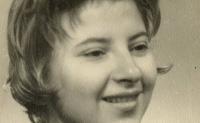 Paris
Paris
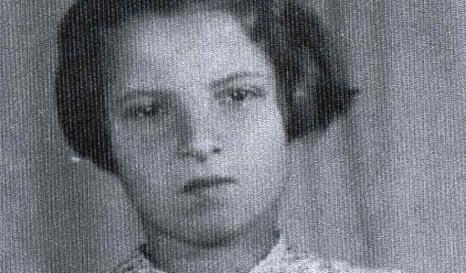
Micheline Herc on her arrival in France (Photograph, Anonymous, 1946). Source: Micheline Herc's Personal archive.
Media subject to copyright.
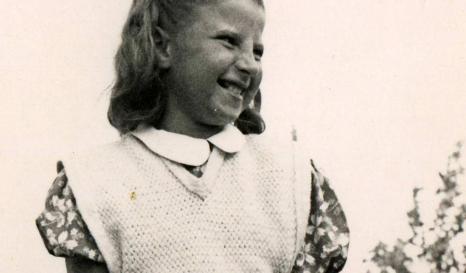
Micheline Herc in Paris (Photograph, Anonymous, 1947). Source: Micheline Herc's Personal archive.
Media subject to copyright.
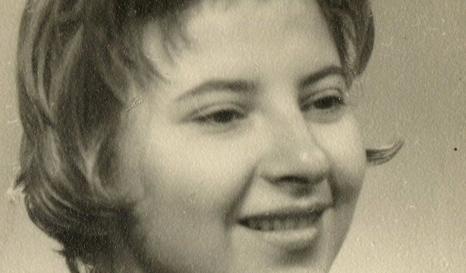
Micheline Herc in Paris, age 20 (Photograph, Anonymous, 1957). Source: Micheline Herc's Personal archive.
Media subject to copyright.
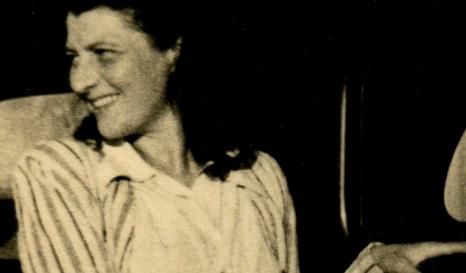
Eugénie, Micheline Herc’s mother, on their arrival in France (Photograph, Anonymous, 1946). Source: Micheline Herc's Personal archive.
Media subject to copyright.
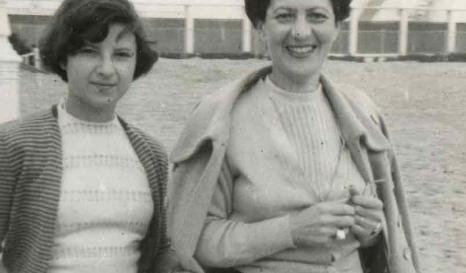
Micheline Herc and her mother at Trouville, 1951 (Photograph, Anonymous, 1951). Source: Micheline Herc's Personal archive.
Media subject to copyright.
CloseParis
Micheline Herc arrived in Paris after a long journey from Kazakhstan via Poland, where she only stayed a few months.
-
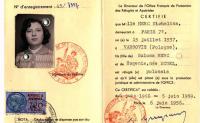 Leaving the USSR – bureaucracy
Leaving the USSR – bureaucracy
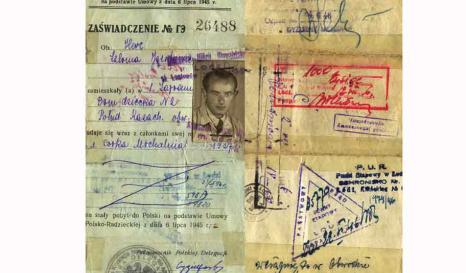
Soviet exit visa for Poland (Document, Anonymous, 1946). Source: Micheline Herc's Personal archive.
Media subject to copyright.
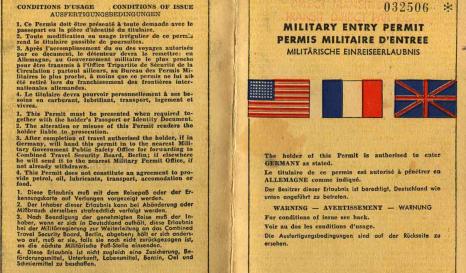
Transit visa to France via Germany (front) (Document, Anonymous, 1946). Source: Micheline Herc's Personal archive.
Media subject to copyright.
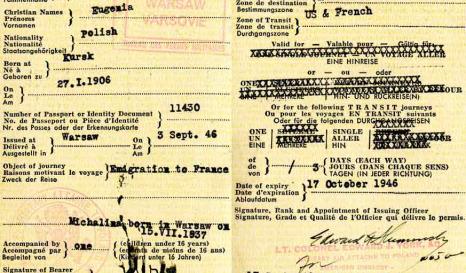
Transit visa to France via Germany (back) (Document, Anonymous, 1946). Source: Micheline Herc's Personal archive.
Media subject to copyright.
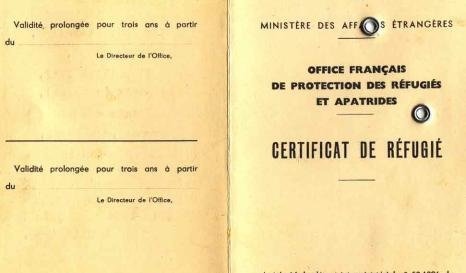
Refugee certificate issued to Micheline Herc by OFPRA, Paris, 6 june 1956 (front) (Photograph, Anonymous, 1956). Source: Micheline Herc's Personal archive.
Media subject to copyright.
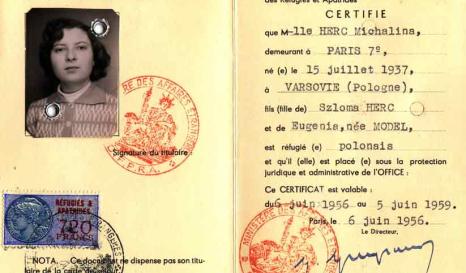
Refugee certificate issued to Micheline Herc by OFPRA, Paris, 6 june 1956 (back) (Photograph, Anonymous, 1956). Source: Micheline Herc's Personal archive.
Media subject to copyright.
CloseLeaving the USSR – bureaucracy
Leaving the USSR was a long process, where various papers had to be obtained in order to have a status and cross the borders. Following documents are shown here:
- Soviet exit visa for Poland
- Transit visa from Poland to France via Germany
- Refugee certificate issued by OFPRA
- Refugee certificate issued to Micheline Herc by OFPRA (front)
- Refugee certificate issued to Micheline Herc by OFPRA (back)
- Transit visa to France via Germany (front)
- Transit visa to France via Germany (back)
-
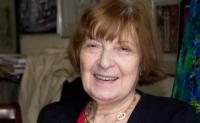 Radio portrait of Micheline Herc
Radio portrait of Micheline Herc
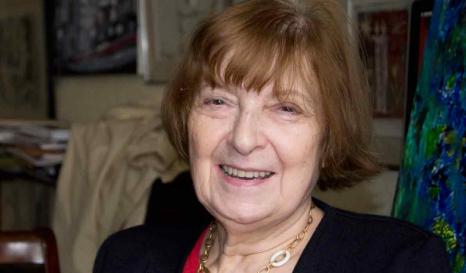
Source: Interview conducted in France by M. Craveri & A. Blum, 31/03/2011.
Licence CC BY-NC-ND.
CloseRadio portrait of Micheline Herc
Yasmine Chouaki’s programme En sol majeur (RFI) on Monday 27 February 2012 was dedicated to Micheline Herc


